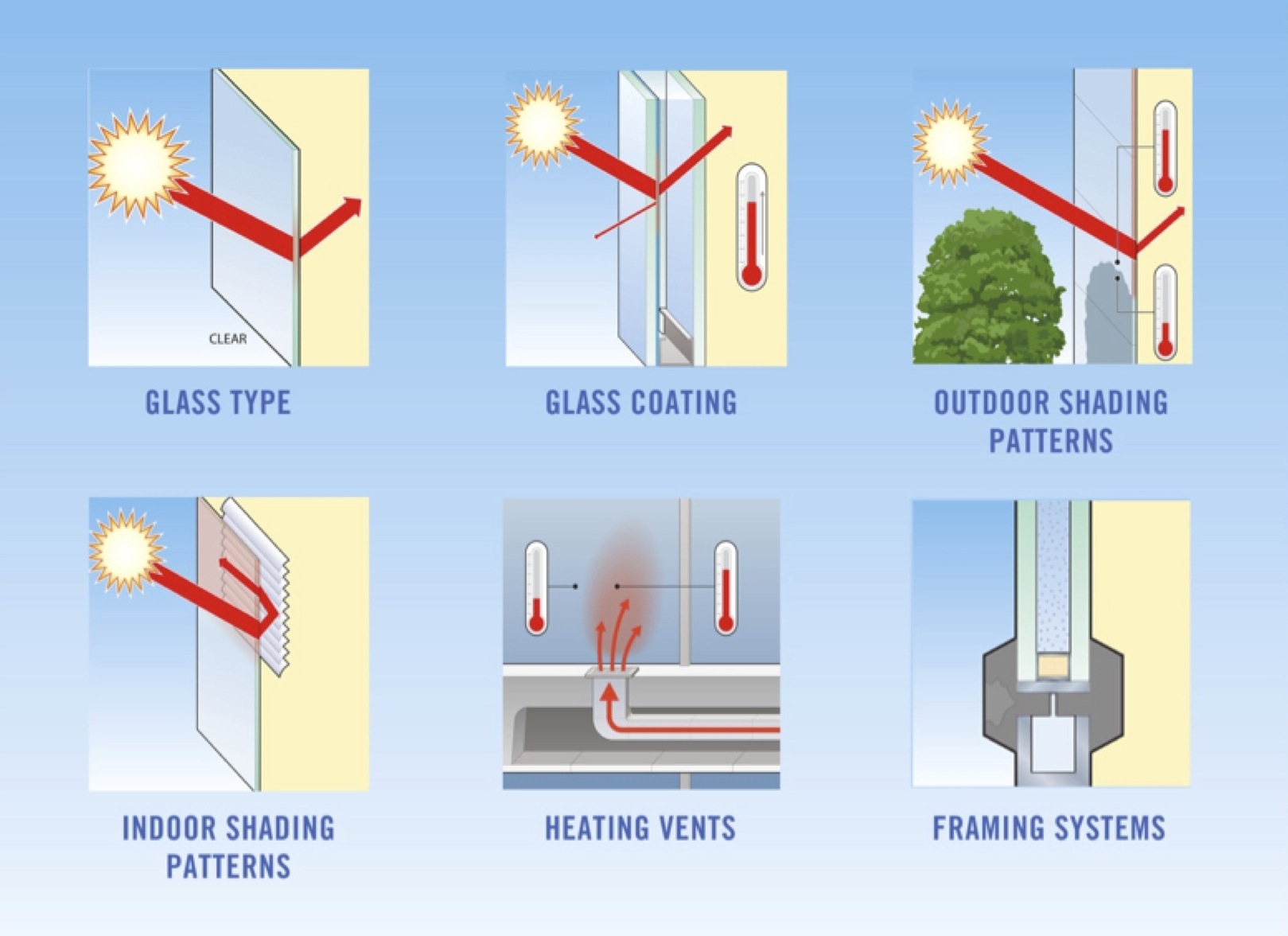Thermal stress is one of many factors that can cause glass to break, even when it is not impacted by a projectile.
Such failures usually are not a testament to the quality of the glass, but rather the result of temperature imbalance within the glass, which can occur when the center of a window or insulating glass unit (IGU) heats and expands while the edges remain cool.
The resulting thermally induced tensile stress on the glass edges can exceed the strength of the glass itself, causing it to break at approximately a 90-degree angle.
Working closely with the IGU fabricator and glass supplier, and conducting a thermal stress analysis at the beginning of the design phase can help architects specify the proper glass for their projects. Here are five thermal stress related rules-of-thumb to consider when specifying glass:
1. Clear or color? Glass can be clear, ultra-clear or tinted in colors such as gray, blue, green and bronze. Tinted glasses absorb solar radiation more than clear glass, which can cause them to collect heat and make them more susceptible to break from thermal stress.
2. Inner or outer surface? Reflective and low-emissivity (low-e) coatings, which improve the solar performance of glass primarily by reflecting solar radiation, can be placed on any one of four surfaces in a dual-pane IGU. While they are usually placed on the inner glass surfaces of the IGU, the coating orientation and the associated risk of thermal stress has to be taken into account.
3. Sunny or shady? Outdoor shading, including overhangs, adjacent buildings, and trees, is one of the most dynamic elements to consider when analyzing thermal stress. Minimizing locations where non-uniform shading of IGUs can occur will help avoid extreme temperature gradients. Interior shading devices, such as blinds or drapes, can increase glass temperature by reflecting solar radiation back through the glass or by reducing the convection and conduction of heat away from the glass. To minimize thermally induced edge stress, the air space around the window glass should be ventilated. There should be a gap of several inches between the glass and shades, blinds or drapes.
4. Where to place a vent? If heating vents, registers and grilles point directly at glass units, warm air will cause the glass to heat up and, under certain conditions, break. Make sure vents are carefully placed to reduce thermal stress risk and avoid placing them between the glass and interior shading devices.
5. How to frame it? Glass framing systems that have low heat capacity also can minimize the chance of a thermal stress break. Structural gaskets and narrow metal framing are favorable because they have less effect on the glass temperature around the edges. Conversely, massive framing – whether metal, masonry or even wood – can have more of an effect, resulting in thermal imbalance and risk of glass breakage.
To learn more about avoiding thermal breakage of insulated glass units and other glass-related topics, visit the PPG Glass Education Center at www.educationcenter.ppg.com.
Related Stories
Designers | Oct 1, 2024
Global entertainment design firm WATG acquires SOSH Architects
Entertainment design firm WATG has acquired SOSH Architects, an interior design and planning firm based in Atlantic City, N.J.
Higher Education | Sep 30, 2024
Studio Gang turns tobacco warehouse into the new home of the University of Kentucky’s College of Design
Studio Gang has completed the Gray Design Building, the new home of the University of Kentucky’s College of Design. In partnership with K. Norman Berry Associates Architects, Studio Gang has turned a former tobacco warehouse into a contemporary facility for interdisciplinary learning and collaboration.
Warehouses | Sep 27, 2024
California bill would limit where distribution centers can be built
A bill that passed the California legislature would limit where distribution centers can be located and impose other rules aimed at reducing air pollution and traffic. Assembly Bill 98 would tighten building standards for new warehouses and ban heavy diesel truck traffic next to sensitive sites including homes, schools, parks and nursing homes.
Laboratories | Sep 27, 2024
Traditional lab design doesn't address neurodiverse needs, study finds
A study conducted by ARC, HOK, and the University of the West of Scotland, has revealed that half (48.1%) of all survey respondents who work in laboratory settings identify as neurodivergent.
Laboratories | Sep 26, 2024
BSL conversions: A cost-efficient method to support high-containment research
Some institutions are creating flexible lab spaces that can operate at a BSL-2 and modulate up to a BSL-3 when the need arises. Here are key aspects to consider when accommodating a rapid modulation between BSL-2 and BSL-3 space.
MFPRO+ News | Sep 24, 2024
Major Massachusetts housing law aims to build or save 65,000 multifamily and single-family homes
Massachusetts Gov. Maura Healey recently signed far-reaching legislation to boost housing production and address the high cost of housing in the Bay State. The Affordable Homes Act aims to build or save 65,000 homes through $5.1 billion in spending and 49 policy initiatives.
Designers | Sep 20, 2024
The growing moral responsibility of designing for shade
Elliot Glassman, AIA, NCARB, LEED AP BD+C, CPHD, Building Performance Leader, CannonDesign, makes the argument for architects to consider better shade solutions through these four strategies.
Mixed-Use | Sep 19, 2024
A Toronto development will transform a 32-acre shopping center site into a mixed-use urban neighborhood
Toronto developers Mattamy Homes and QuadReal Property Group have launched The Clove, the first phase in the Cloverdale, a $6 billion multi-tower development. The project will transform Cloverdale Mall, a 32-acre shopping center in Toronto, into a mixed-use urban neighborhood.
Codes and Standards | Sep 19, 2024
Navigating the intricacies of code compliance and authorities having jurisdiction
The construction of a building entails navigating through a maze of regulations, permits, and codes. Architects are more than mere designers; we are stewards of safety and navigators of code compliance.
Higher Education | Sep 18, 2024
Modernizing dental schools: The intersection of design and education
Page's John Smith and Jennifer Amster share the how firm's approach to dental education facilities builds on the success of evidence-based design techniques pioneered in the healthcare built environment.

















